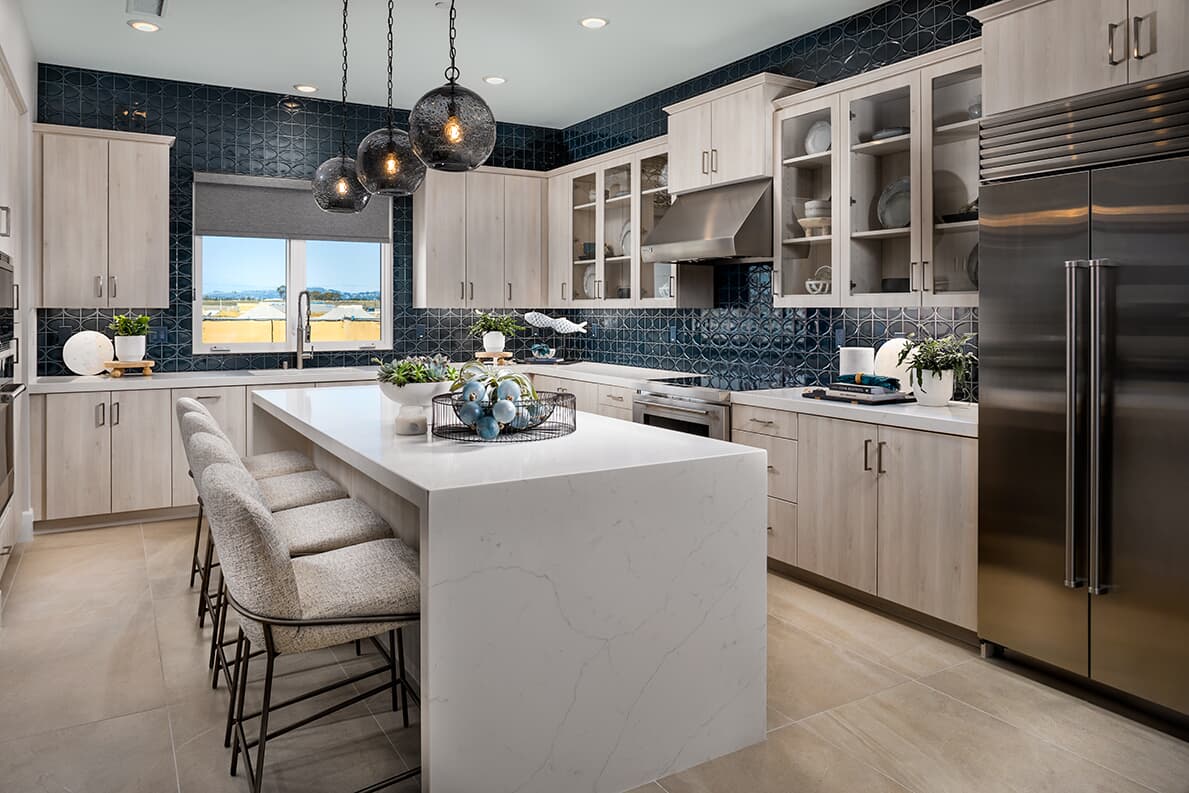Limited time savings on select homes. Explore Promotions now!
What’s the Difference Between Ceramic Tile, Cement Tile and Porcelain Tile?

Floor tiling provides a beautiful, solid foundation for any room in the home. It can also create a room-like feel when it’s used outdoors to define an area, such as a patio space or a front porch. In addition to laying it on the floor, it can also add value and a solid foundation to countertops and walls.
No matter where you use tile, it can be an investment that can add value to your home. There are several options for tiles in terms of color, feel, durability, maintenance, and materials. That’s why it’s important to choose wisely so it remains timeless and durable over the years to come.
The Most Common Type of Tiles
The most common types of tiles used today are cement tile, ceramic tile, and porcelain tile. Let’s go over the differences between each type of tile and the reasons for choosing one over the other.
What Is Cement Tile?
“Cement tiles are very popular now. Cement tile is often thicker than other tile types. A lot of cement tile designs feature hand painting,” says Deborah Armstrong, senior interior designer for Brookfield Residential. “You’re going to see the cost get higher because they’re all hand done, but they’re very popular now.”
Cement tile typically comprises sand, cement, some color, pigmentation, and ground marble, which makes it a durable tile. It can be used for floors, walls, and countertops. “It’s important that it be sealed in certain rooms,” Armstrong says. This includes any room where water or stains may be a common factor.
If you choose to use cement tile in the shower, be sure that the tiles are sealed prior to use and at frequent intervals after installation, Armstrong advises. “If it’s an unglazed tile, if it was my shower, I’d definitely use a glazed ceramic or porcelain tile,” she says.
What Is Ceramic Tile?
Ceramic tile is typically made from clay, sand, and water and often features a glazed finish. It tends to not be as strong as cement tile, Armstrong says. Ceramic tiles are waterproof, which makes them ideal to use in kitchens and bathrooms.
Ceramic tile is available in looks that mimic natural stone or wood. Ceramic tiles may be specifically made for use on floors or walls. Ceramic tile is similar in look to porcelain tile, but not in composition.
What Is Porcelain Tile?
Porcelain tile is fired at very high temperatures, making it dense and mostly non-porous. Because of this, porcelain is considered to be stronger than ceramic tile and able to withstand greater temperature changes. It usually has a glazed finish that acts as a barrier for water protection.
Like ceramic tile, porcelain tile is also made to mimic natural stone such as marble and natural wood. Ceramic tiles may be less expensive in many cases than porcelain tiles.
Do You Need To Seal Tile?
Cement tile needs to be frequently resealed because it features an unglazed surface. The glazing that is part of the manufacturing process with ceramic and porcelain tiles can eventually wear off, Armstrong says, “and there’s not really much you can do about that, except replace the tile.”
The grout used between the tiles should be frequently sealed; however, there are epoxy grouts available on the market that are intended to extend the time between sealings.
Does Tile Need Underlayment?
Underlayment should be used with all types of tile to help prevent the tiles from cracking, says Armstrong. “You definitely need a rubber or a waterproof membrane to avoid leaks,” she says.
“Its durability is largely dependent on the grout, the way the grout was laid and whether the proper underlayment is used,” Armstrong says.
Are All Types of Tiles Glazed?
Some cement tiles and saltillo tiles may not be glazed. Ceramic and porcelain tiles usually feature a top glaze coating that helps to make them waterproof. “The kind of glazing used fires almost like a glass surface,” Armstrong notes.
Weighing the Durability of Types of Tile
Tile can last forever if you take good care of it,” says Armstrong. “All tile can crack, depending how it’s laid or what’s dropped on it.”
It’s important to use the proper underlayment with cement and other tile types to provide support and help prevent it from cracking, Armstrong says. A professional flooring installation company will be familiar with the right type to use.
What Are the Costs To Install Ceramic, Porcelain and Cement Tile?
Installation costs vary by installer, where you live and on other factors. For ceramic and porcelain tile, the estimates vary widely, from lows of $3 per square foot to higher than $50. Cement tile seems to be in the range of $2 to $8.
Now It’s Your Turn:
Ceramic, porcelain, and cement tiles are good choices, depending on the look you want and the application. Proper installation of any tile can make the difference between having tile that has lasting beauty over the years or tiles that need to be replaced in a short time.
For more interior decorating tips and ideas, take a look through our blog. If you have questions about the materials used in new Brookfield homes, be sure to contact your local Brookfield representative.
